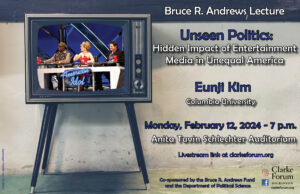 Anita Tuvin Schlechter Auditorium, 7 p.m.
Anita Tuvin Schlechter Auditorium, 7 p.m.
Bruce R. Andrews Lecture
Unseen Politics: Hidden Impact of Entertainment Media in Unequal America
Eunji Kim, Assistant Professor in the Department of Political Science at Columbia University
There is a simple and uncomfortable truth about the nation still recovering from the scars of a reality TV presidency: given the dazzling array of media choices, Americans are not watching news. If our media diet primarily consists of entertainment media, how does it shape politics? In this hyper-politicized world full of partisan news media, it might seem implausible that something as frivolous as entertainment media could possibly affect people’s political attitudes. Defying such conventional wisdom, Kim theorizes and describes the unique power of entertainment media in shaping political attitudes and behaviors. In particular, this talk introduces a puzzle in American politics that can be addressed by bringing entertainment media to the table. In this age of intensifying income inequality, the concerns about the fading American Dream from politicians on both sides of the partisan aisle are omnipresent. Nevertheless, many Americans continue to view the United States as the land of opportunity. Why do beliefs in economic mobility persist despite the raft of empirical evidence to the contrary? The ivory-tower academics and pundits alike have largely turned to news media for an answer, only puzzled to find that sobering media coverage about declining mobility has little effect on public opinion.
Instead, what has been attracting millions of viewers in the past two decades are entertainment programs that depict real-life Americans succeeding due to their hard work and talent. Popular shows ranging from America’s Got Talent and Shark Tank—all featuring “rags-to-riches” exemplars—easily attract prime-time audiences seven times larger than those watching Fox News. This narrative from entertainment media that the American Dream is alive and well is directly counter to what news media provides; the former is consumed by the vast majority of Americans every day, while the latter is not. These “rags-to-riches” entertainment programs promote rugged individualism; their meritocratic ideology glorifies the winners in the economic system, increases tolerance for income inequality, and dampens public support for redistributive policies that could help those who are left behind.
This program is sponsored by the Clarke Forum for Contemporary Issues and the Bruce R. Andrews Fund and co-sponsored by the Department of Political Science.
Topic overview written by Isa Mester ’26
Biography (provided by the speaker)
 Eunji Kim is an assistant professor in the Department of Political Science at Columbia University. She specializes in political communication and public opinion in American politics. Prior to joining Columbia University, she was an assistant professor of political science at Vanderbilt University. She received a joint Ph.D. in political science (Arts & Sciences) and communication (Annenberg) and an M.A. in statistics (Wharton) from the University of Pennsylvania. She received a B.A. in government from Harvard University.
Eunji Kim is an assistant professor in the Department of Political Science at Columbia University. She specializes in political communication and public opinion in American politics. Prior to joining Columbia University, she was an assistant professor of political science at Vanderbilt University. She received a joint Ph.D. in political science (Arts & Sciences) and communication (Annenberg) and an M.A. in statistics (Wharton) from the University of Pennsylvania. She received a B.A. in government from Harvard University.
Professor Kim’s research has been funded by Facebook (now Meta) as well as the Russell Sage Foundation. Her research has received several prizes, including the American Political Science Association’s Best Dissertation in Political Psychology Award, Best Article in Political Behavior Award, Paul Lazarsfeld Best Paper Award, Wilson Carey McWilliams Best Paper Award; International Communication Association’s Kaid-Sanders Best Political Communication Article Award; the International Society of Political Psychology’s Roberta Sigel Early Career Scholar Paper Award.
Her work has been published in the American Journal of Political Science, Proceedings of the National Academy of Sciences, Political Behavior, Political Psychology, International Organization, Research & Politics, and Quarterly Journal of Political Science.
Related Links
A journal article that offers the empirical basis for the
talk; https://onlinelibrary.wiley.com/doi/10.1111/ajps.12702
The Bruce R. Andrews Lecture
Until he passed away on January 8, 2005, Bruce R. Andrews was Robert Blaine Weaver Professor Emeritus of Political Science. Bruce taught at Dickinson from 1960 until his retirement in 1992. Recipient of The John J. Curley and Ann Conser Curley Faculty Chair in 2003, Bruce was one of the college’s most distinguished and influential professors in the last 50 years. Bruce was loved and respected by students, colleagues on the faculty and staff, and many friends he and his wife Margery and children Stephen, Mary-Margaret and Carolyn had and have in the Carlisle community. His warm and engaging personality, deep knowledge of American politics, commitment to the liberal arts and active role as a citizen brightened and informed everything he did at Dickinson. As a living memorial to the example Professor Andrews set as a teacher, mentor and friend, those who knew him have endowed the Bruce R. Andrews Fund to continue the kind of vibrant discussion of politics and public life to which Bruce devoted his life.
